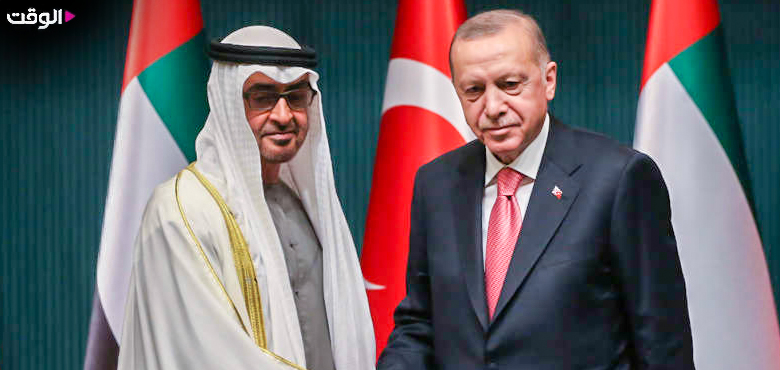Alwaght- While the protests around the highly luxurious palace of President Erdogan calling for his resignation over rallying prices and devaluing national currency are grabbing calm from the Turkish leader, he perhaps more than anything needs to a miracle. It is quite surprising that perhaps a large part of his hope is set to his decade-long regional rival and even foe Mohammed bin Zayed, crown prince of Abu Dhabi.
In the midst of the most critical political situation for Erdogan since the Justice and Development Party (AKP) came to power in 2002, bin Zayed, recognized as the sworn enemy of the Muslim Brotherhood and Erdogan in the region, visited Turkey on November 24. Along with trip news, political and economic observers and media circles highlighted bin Zayed's offer made earlier this year to invest $100 billion in Turkey. According to media reports, earlier this year, the Abu Dhabi crown prince offered Erdogan a minimum investment of $10 billion and a maximum of $100 billion in the Turkish economy.
Given this huge sum for investment, the assumption is that bin Zayed visited Ankara to save Erdogan. From a different angle, Erdogan stretched out his hand for help from his staunch foe. Here is a question: How optimistic can Erdogan and the AKP be about bin Zayed's financial lifeline?
Will bin Zayed and his cash be lifesaving to Erdogan?
Bin Zayed's visit to Ankara comes at a time when Turkey is rocked by a devastating currency crisis that has prompted calls from opposition parties as well as a large number of citizens for Erdogan to resign and hold early parliamentary and presidential elections. With the latest polls showing that Erdogan's popularity among Turkish citizens has dropped to 38 percent, which is unprecedented in two decades, whether the Emirates strongman can save Erdogan from collapse is now a serious question. The argument is that contrary to initial assumptions, Abu Dhabi's cooperation with Turkey is extremely hard to benefit Erdogan due to the entrenched differences between the two, and even in case of realization of the support, it cannot heal the troubled Turkish economy. All the signals show that presently UAE cannot make huge investment in Turkey.
Smiles of UAE-Turkey leaders just a diplomatic gesture: Can really Erdogan set his heart on his key enemy in a decade and who is behind the coups against his allies in Egypt, Sudan, Libya, and even himself as a rescue angel amid an economic predicament? Or perhaps bin Zayed visited Ankara to see for himself how Erdogan is sinking. Either way, we cannot see end to rivalry from the smiles for media by the two leaders who both are holding dream of leadership of the region. Their relations at present are hit by a great deal of distrust and how far they can go for cooperation and partnership is a point of question.
Deep-rooted tensions dominating Ankara-Abu Dhabi relations
Since the beginning of the year, signals of de-escalation from Ankara and Abu Dhabi have been exchanged, and in June and July, the UAE took steps to reduce some restrictions and barriers for Turkish businessmen and investors and facilitate their travel to the UAE. In return, Ankara sent a new ambassador to Abu Dhabi and scaled down media attacks on the UAE. However, over the past decade there has been a considerable level of political rift between the two countries that cannot be easily resolved.
Talking about $100 billion investment in Turkey is just words. We need to ask what happened in their competition in Libya, Syria, and Tunisia that facilitates their détente and motivates bin Zayed to give Erdogan a helping hand. Turkey continues to insist on its positions on Libya, Tunisia, Syria and even its massive presence in the Mediterranean and the Horn of Africa. The fact is that the UAE's $100 billion rapid investment in Turkey lacks an internal logic, and it seems that at best, $3 to $4 billion investment by Abu Dhabi Investment Authority and companies close to the UAE royal family in Turkish healthcare, financial technologies, and other sectors is the highest expectation.
UAE's huge foreign debt makes help promise to Erdogan an empty one: The UAE is financially weakened by low oil prices since 2018, coronavirus outbreak, and plunge in tourism revenues. In 2020, its foreign debt set a new record with $106.72 billion, touching 96 percent of its GDP. With this in mind, $100 billion investment promise by Erdogan is just a sweet dream Erdogan can have without expectation of realization.



























